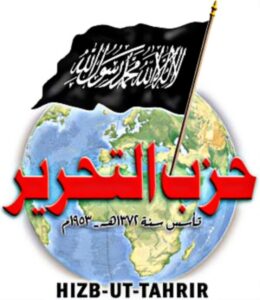Hizb ut-Tahrir (Arabic: حزب التحرير, meaning “Party of Liberation”) is a transnational Islamic political organization founded in 1953 in Jerusalem by Taqiuddin al-Nabhani, a Palestinian Islamic scholar. It seeks to re-establish the Caliphate, a form of Islamic governance that unites Muslim countries under a single leader, the Caliph. The group advocates for the establishment of this Caliphate through non-violent means, aiming to implement Islamic law (Sharia) and remove any form of Western political or military influence from Muslim countries.

Key Objectives:
- Re-establish the Caliphate: Hizb ut-Tahrir believes that the Muslim world should be united under a single Caliph who will implement Islamic law and ensure the wellbeing of the global Muslim community (Ummah).
- Implement Islamic Law (Sharia): The group advocates for the governance of all societal aspects by Sharia, ranging from economics to personal conduct, to be enforced once the Caliphate is re-established.
- Non-violent Strategy: Although often seen as radical due to its ideological stance, Hizb ut-Tahrir officially rejects violent means to achieve its aims. Instead, it engages in political advocacy, education, and social outreach to spread its ideas.
Structure and Operation:
- International Reach: While originally established in the Middle East, Hizb ut-Tahrir operates globally, with active branches in Central Asia, Europe, Southeast Asia, and parts of Africa. It remains banned in many Muslim-majority countries like Egypt, Turkey, and Saudi Arabia.
- Membership: The organization operates as a cadre-based movement, where highly committed members actively spread its message, often targeting Muslim intellectuals, students, and professionals.
- Centralized Leadership: Hizb ut-Tahrir is led by a central leadership body known as the Wilayah, with a global leader called the Amir.
Ideology:
- Anti-Colonialism: The group sees Western political, military, and cultural influence in Muslim-majority countries as a form of modern colonialism. It rejects all Western-led institutions, including the United Nations and international law.
- Political Islam: Hizb ut-Tahrir advocates for an Islamic political order that encompasses all areas of life, including politics, economics, and social norms. The group believes secularism is incompatible with Islam.
- Opposition to Nationalism: It strongly opposes the concept of nation-states, arguing that national borders are artificial divisions imposed by Western powers after the fall of the Ottoman Caliphate.
Criticism and Controversy:
- Bans and Restrictions: Hizb ut-Tahrir is banned in several countries, including Russia, Germany, Egypt, and many Central Asian republics. In some nations, it is seen as a threat due to its potential to radicalize populations, although it maintains its non-violent stance.
- Perceived Radicalization: Some critics accuse the group of promoting extremist views, which may contribute to radicalization, even if the group itself does not engage in or directly promote violence.
- Misunderstanding of Democracy: The group has often been criticized for misunderstanding or rejecting democratic institutions and principles, which they argue are incompatible with Islam.
Global Presence:
- Middle East: Active, but banned in most countries due to its opposition to local regimes and their ties to Western governments.
- Europe: Hizb ut-Tahrir is more open in its operations, especially in the UK and Denmark, where it has held conferences and distributed literature.
- Central Asia: Particularly active, though often operating underground due to bans. In places like Uzbekistan and Tajikistan, members have faced harsh government crackdowns.
Recent Developments:
Hizb ut-Tahrir continues to spread its message globally, primarily using digital platforms and social media, even though it faces significant restrictions in several countries. It remains a unique entity within political Islam because of its focus on re-establishing the Caliphate and its refusal to embrace the use of violence, unlike other militant groups that share similar objectives.

Dead indited subject matter, Really enjoyed looking at.
I have read some good stuff here. Definitely worth bookmarking for revisiting. I wonder how much effort you put to make such a wonderful informative site.
wonderful post.Never knew this, thankyou for letting me know.
Wow! This can be one particular of the most beneficial blogs We’ve ever arrive across on this subject. Basically Fantastic. I’m also a specialist in this topic therefore I can understand your effort.
I really like your blog.. very nice colors & theme. Did you make this website yourself or did you hire someone to do it for you? Plz reply as I’m looking to design my own blog and would like to know where u got this from. cheers
It’s really a great and helpful piece of info. I’m glad that you shared this helpful information with us. Please keep us up to date like this. Thanks for sharing.